The Three Peaks: How Yorkshire's most famous walk has put a community under strain


In 1887, two teachers from nearby Giggleswick School made the first recorded ascent of Pen-y-Ghent, Whernside and Ingleborough.
R Wynne-Edwards and D Smith completed the feat in 10 hours - well short of the modern target time of 12.
Advertisement
Hide AdAdvertisement
Hide Ad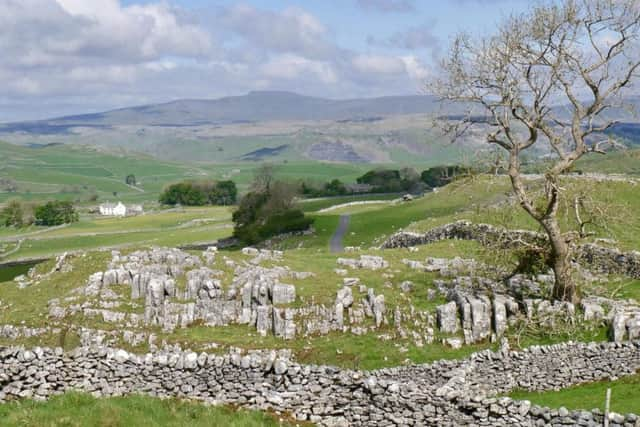

By the 1920s and 30s, the route was becoming a popular endurance challenge and the times were being whittled down to five and six hours.
Fell runners also embraced it - every April since 1954 the Three Peaks Race, known as the 'marathon with mountains', has been held, and the course record is held by Andy Peace, of Bingley Harriers, who ran in 1996 and finished with a time of two hours, 46mins and three seconds. In 1978, harsh weather conditions claimed the life of a runner from London, Edward Pepper, who got lost descending Ingleborough and died of exposure. His body was not found until the next day.
Nowadays, the walk is a well-trodden charity challenge and recreational route, with summer weekends seeing hundreds of people muster in the village of Horton-in-Ribblesdale to prepare for their ascent. The Three Peaks are well and truly on the tourist trail - but at what cost?
The ill-prepared walkers who call 999
Advertisement
Hide AdAdvertisement
Hide Ad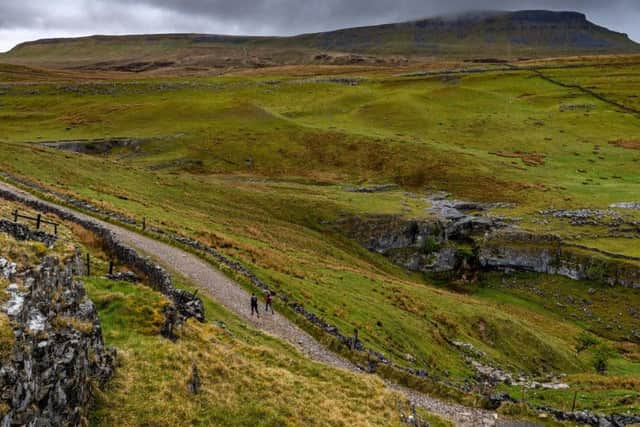

For mountain rescue teams in the area, serious emergencies - trapped cavers, injured hikers - are punctuated by regular call-outs to Three Peaks walkers who are simply unprepared for the conditions. Large groups set out, often containing members who are unfit for the rigorous trek and soon fall behind. Some attempt it alone, and become lost. Others are not properly equipped for a long stint in the mountains.
In March 2019, the Clapham-based Cave Rescue Organisation issued a plea to walkers not to attempt the challenge after a large section of the route between Pen-y-Ghent and Ribblehead flooded. The warning was delivered after video footage emerged of a group of men from Castleford wading through the thigh-deep water before turning back.
In September 2015, eight women had to be rescued by the CRO volunteers after getting lost in the dark on Ingleborough. They did not have maps, compasses or torches and were relying on smartphone apps to navigate. The organisation again released a warning to charity groups to ensure their members had suitable clothing and equipment for what can be a hostile and unpredictable environment.
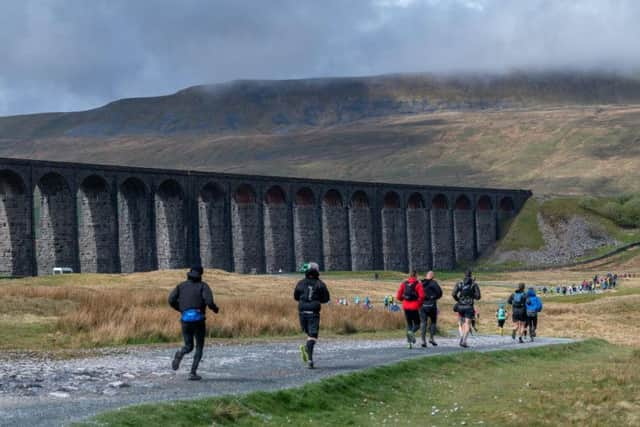

A quick scan of the CRO's incident logs from March and April this year reveals numerous episodes of walkers suffering cramp, getting lost without a map or becoming detached from larger groups, and in one case, simply 'needing assistance to descend a steep section'.
The volunteer who 'retrieves' lost Three Peakers
Advertisement
Hide AdAdvertisement
Hide AdCRO volunteer Jonty Rhodes, a keen climber, lives in Horton and admits he often spends summer Saturday evenings 'sweeping up waifs and strays' from Ingleborough as dusk falls.
"Three Peaks walkers are our bread and butter now! We get quite a lot of unnecessary call-outs from people who aren't prepared. mostly they haven't taken a torch with them and it's got dark. It's frustrating - a big chunk of our volunteers' time is spent retrieving Three Peakers."
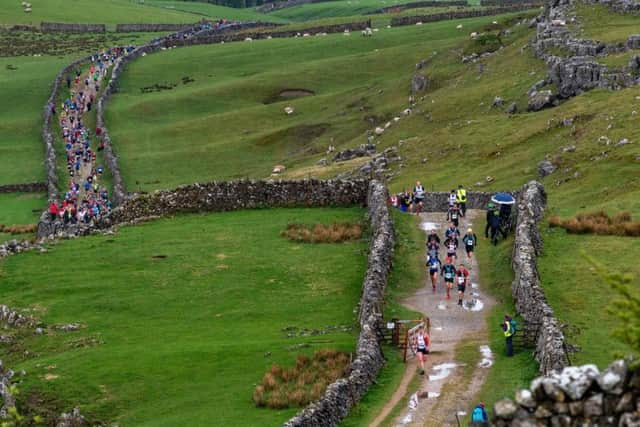

Jonty's colleagues have seen as many as 3,000 people on the summit of Pen-y-Ghent at one time, and he reckons around 200,000 people attempt the challenge every year.
"It's just par for the course. We get a lot of minor leg injuries in people who haven't done enough training, and a lot of trips and slips.
Advertisement
Hide AdAdvertisement
Hide Ad"The charities do provide guides, but they just want the sponsorship money really - they are raising funds for themselves at the expense of our charity, which needs £60,000 a year to operate.
"It's difficult for us to comprehend how many of them turn up without a map or compass, and no route knowledge of an unfamiliar area. The challenge is definitely getting more popular each year."
Memorable rescues have included a 999 call last Christmas from a young couple who were stranded on Ingleborough in darkness with no source of light.
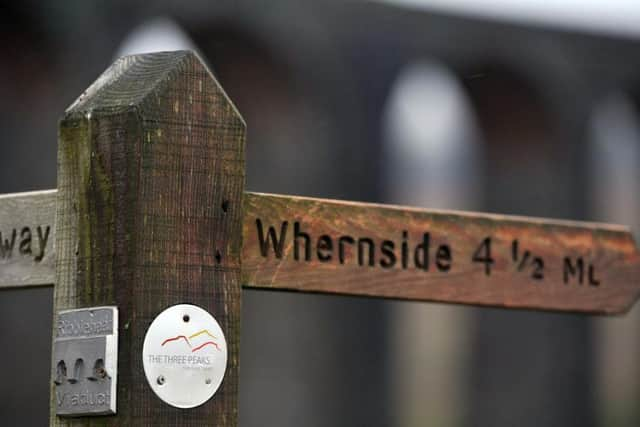

"The girl was wearing Converse, it was wet and freezing, they had no torch. In those situations you just have to frogmarch them down. The man told us he'd done the route before, but in August, and he didn't realise it would get dark so early!"
Advertisement
Hide AdAdvertisement
Hide AdThe rescue teams and mountaineering community refer to the 'Julia Bradbury effect' - meaning that when a TV presenter climbs a particular mountain on screen, they can guarantee hordes of walkers will descend on it the following weekend.
"We also have a lot of groups in the 20-35 age group who will stay in a local pub on the Friday night and drink until the early hours, so they're not in the best condition. We rescue a lot of dogs with sore feet as well. People will bring a large dog on a long walk and then call 999 when it refuses to move."
There has also been conflict with residents of Horton, the most popular starting point for the route.
"Behaviour has got worse and worse. Coaches will offload hundreds of people. I love living in a place that people want to visit, but the noise can be horrendous. If I tell people to keep it down I can get a mouthful of abuse. I sometimes go out and check they've got maps, torches and a compass. I've also found human faeces all over the mountainside when I went out camping with my son - it was deeply unpleasant."
Advertisement
Hide AdAdvertisement
Hide AdIrresponsible guiding and adventure travel companies also contribute to the problems.
"They will often park their snack vans and support vehicles in disabled bays. They charge a lot of money for people to walk on a public footpath.
"In summer, I don't open a beer until it's past 11pm, because I know that myself and the other local volunteers will end up going up the hill and sweeping up the waifs and strays!"
Advertisement
Hide AdAdvertisement
Hide AdThe Yorkshire Dales National Park Authority has even drawn up a code of conduct for walkers to prevent anti-social behaviour such as noise, littering and inconsiderate parking, and introduced a notification service so it can avoid clashes between large groups of more than 100 people.
The tour guide trying to do things differently
Among the tour companies looking to operate sustainable trips is Northern Guiding, run by mountain leader Mark Killala.
Writing on his blog, the experienced walker highlights the problems faced by those living near the footpaths.
"A group of businessmen have suggested changing the start point for the start of the Three Peaks walk from Horton-in-Ribblesdale to Ingleton to relieve pressure on Horton. Now I can see why the locals in Horton get fed up. They live in a National Park and they expect some of that tranquility which the countryside gives you. But on some weekends it is pandemonium. In fact it can get so bad that people sometimes leave their homes over the weekend. The main complaints are noise in the early mornings and late evenings or during the night plus the parking problems which influxes of walkers bring. Reports of people urinating and verbal abuse have been heard. Residents say their lives have been made a misery."
Advertisement
Hide AdAdvertisement
Hide AdMark is not convinced that moving the muster point to Ingleton is a feasible solution, as it would add six miles and 140 metres of climbing to the route - at risk of diverting business away from Horton's pubs and cafes, which depend on Three Peaks traffic.
"As an experienced guide who loves the Three Peaks walk and wants to help it prosper, I am certainly not being complacent. I think the best thing to do is to promote other start points along the route, the main ones being Ribblehead and Chapel-le-Dale. My company Northern Guiding starts all our guided Three Peaks walks from Ribblehead. The reason why I chose this was that it is simply a nicer location. We meet at 6.30am on a morning so we do not create a disturbance to local people. Also, you escape the hordes of visitors which gives us that more relaxing and peaceful start which I believe most walkers want."
For Jonty Rhodes and the CRO volunteers, there looks to be no stemming the tide of walkers streaming in from the cities, many of them seemingly prepared for little more than an easy stroll.
"It's like they leave their brains at home sometimes."